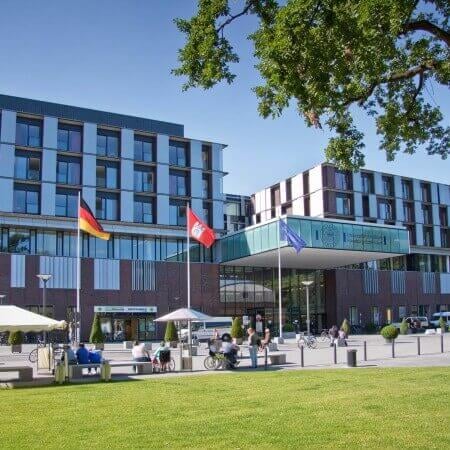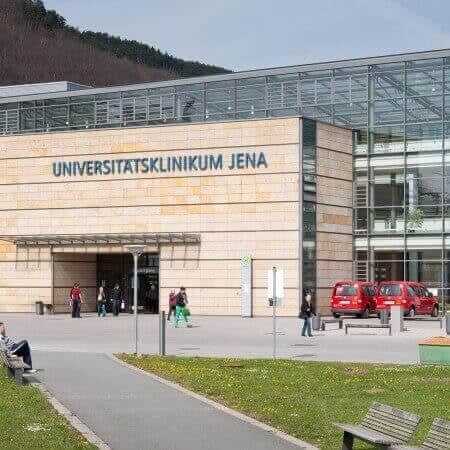Testicular seminoma is the most common cancer in young men. If timely detected, the disease can be successfully cured. In Europe, this pathology can be cured even at the advanced stage.
90% of testicular malignancies are seminomas. Their treatment abroad involves the use of surgery, chemotherapy and radiation therapy. Surgical interventions are performed using minimally invasive techniques, including robot-assisted surgical systems. After surgery, patients receive high-quality pain management, symptomatic and supportive therapy, comprehensive care and rehabilitation.
Content
- Diagnostics of seminoma
- Principles of testicular seminoma treatment
- Treatment of stage 1 testicular cancer
- Treatment of stage 2 testicular cancer
- Treatment of stage 3 seminoma
- Treatment of recurrence
- Why is it worth undergoing treatment abroad
- Treatment in Europe with Booking Health at an affordable price
Diagnostics of seminoma
As a rule, patients visit a doctor with complaints of a palpable mass or induration in the testicles. They usually do not have any pain syndrome.
Ultrasound scanning is the main option for the diagnostics of the disease. The doctor uses ultrasound to detect the tumor in the scrotum. So far, he does not know if it is seminoma or not. However, ultrasound scanning alone is usually sufficient to diagnose testicular cancer. Doppler ultrasonography is used to improve the diagnostic accuracy.
MRI is a less commonly used scrotal imaging technique. It is mainly used if doctors need to distinguish testicular cancer from other formations, and ultrasound examination does not allow this. It is sometimes necessary to differentiate cancer from abscesses or other non-cancerous tumors. At the advanced stages of seminoma, MRI scanning is used for detecting brain metastases.
Computed tomography is very rarely used for scrotal imaging, as it emits radiation exposure, and radiation harms the reproductive system. Therefore, the CT scan is performed only in case of contraindications to MRI and insufficient information content of ultrasound scanning for the primary diagnostics of testicular cancer. However, the method is useful for detecting enlarged lymph nodes in the liver and retroperitoneal space, as well as for detecting distant metastases of seminoma in the liver and lungs.
A testicular biopsy is usually not performed to confirm the diagnosis because the procedure promotes cancer spread. Before starting treatment, the doctor does not know for sure whether it is seminoma or not. Only after testicle removal, the material is sent for histological examination, and the type of tumor can be accurately determined.
Laboratory tests are used to assess the levels of testicular cancer markers in the blood. At the stage of initial diagnostics, they allow doctors to guess which tumor they are dealing with. There are two main tumor markers: hCG and AFP (chorionic gonadotropin and alpha-fetoprotein). LDH is of lesser importance, because the levels of this substance may be elevated not only due to testicular cancer, but also due to other diseases. With seminoma, hCG levels can be increased or normal, and AFP levels never increase. The levels of tumor markers allow specialists to assess the effectiveness of treatment and timely detect the recurrence of pathology.
Principles of testicular seminoma treatment
Seminoma refers to testicular tumors with a favorable prognosis. It is usually successfully treated with surgery. In advanced stages, the tumor and its metastases can be destroyed with chemotherapy. Seminoma is also highly sensitive to radiation.
The main treatment option is surgical removal of the testicle. Less commonly, there is a need to remove the retroperitoneal lymph nodes. Surgery to remove metastatic foci in distant organs is very rarely required.
If there are no signs of metastases at the time of testicular cancer detection, then chemotherapy and radiation are usually not used after surgery. In case of metastatic spread or a high risk of metastases, chemotherapy becomes an option of choice. Radiation is considered a less effective method. Unlike chemotherapy, it does not affect all cancer cells in the body, but provides only a local effect, therefore it is mainly used at early stages.
Doctors abroad strive to use sparing treatment options. Surgical interventions are performed using minimally invasive techniques, and chemotherapy is carried out only when indicated.
Treatment of stage 1 testicular cancer
For patients with any stage of seminoma, including stage 1 testicular cancer, the treatment begins with tumor resection surgery. The doctor performs an orchifuniculectomy, during which he removes the testicle, epididymis and spermatic cord. The surgical intervention is performed through the inguinal approach. This surgery is also called radical inguinal orchiectomy.
The first stage of testicular cancer means that the tumor is small, and there are no clinical signs of seminoma metastatic spread to the lymph nodes or organs. The surgical removal of the testicle is the only treatment for 80% of patients, and no other procedures will be required in the future.
However, after surgical treatment for testicular seminoma, follow-up monitoring is required, because 20% of patients will eventually be diagnosed with a tumor recurrence. It is important to detect it in time to cure the disease.
Follow-up monitoring is carried out for 10 years after surgery. If during this time there is no recurrence, it will never happen with a high probability. Although the literature describes cases of late recurrences after 10-20 years or more, these cases are isolated. In most patients, the absence of recurrence within even 5 years of monitoring indicates that the cancer has been successfully cured.
Most seminoma recurrences occur in the first 2 years after surgery. Therefore, patients are monitored especially carefully during this period:
- In the first year after the operation – once every 3 months, the patient undergoes a clinical examination and tests for cancer markers, and once every 6 months, computed tomography is required in order to assess the state of the retroperitoneal lymph nodes.
- Further – once every 6 months, the patient has check-ups, and once a year, CT scanning must be done.
Occasionally, postoperative chemotherapy may be required at the first stage. It is carried out if elevated levels of tumor markers remain in the blood after seminoma removal.
Treatment of stage 2 testicular cancer
Patients with stage 2 also begin treatment with testicle removal surgery, but then additional therapy is required to reduce the risk of recurrence. There are two options:
- Radiation therapy – radiation is directed to the lymph nodes to prevent cancer recurrence.
- Chemotherapy – 4 cycles of etoposide and cisplatin or 3 cycles of bleomycin, etoposide and cisplatin.
For 6 months after chemotherapy or radiation, active surveillance is required for signs of recurrence or tumor progression. If there are no signs of tumor growth, and the levels of markers in the blood are normalized, it is highly likely that seminoma is cured.
In stage 2C seminoma, radiation therapy is usually not used. Patients receive chemotherapy after surgery.
Treatment of stage 3 seminoma
At stage 3, distant metastases appear. Despite this fact, the disease can still be cured. Patients with seminoma usually respond well to chemotherapy and irradiation. Therefore, with local and systemic methods, doctors can eliminate not only the primary tumor, but all metastases.
The most common treatment approach involves surgery and follow-up chemotherapy. Surgical intervention eliminates the main tumor focus, and chemotherapy destroys metastases.
Seminoma treatment is followed by PET scanning. This examination helps the doctors to detect metastases using whole-body scanning. Doctors inject a radiopharmaceutical agent into the patient's blood and watch where it accumulates intensively.
If the PET scan detects seminoma metastases, then the following treatment options are possible, depending on the localization of the metastatic foci:
- Retroperitoneal lymph node dissection, which is the surgical removal of retroperitoneal lymph nodes.
- Surgical removal of lung, liver and brain metastases.
- Radiation therapy for suppressing brain metastases with radiation.
Surgical removal of retroperitoneal lymph nodes is less traumatic in developed countries, because it is performed laparoscopically. After such interventions, patients are less likely to suffer from complications, need less care and pain management, recover faster, and are discharged from the hospital earlier.
Some hospitals perform operations using robot-assisted surgical systems. They are distinguished by increased safety even as compared to laparoscopic procedures. The surgical procedure is performed by robotic arms, which the doctor controls remotely. The surgeon sees the surgical field better, and the instruments have more degrees of freedom. The doctor can get to the most hard-to reach sites to remove all cancer metastases and prevent recurrence.
To destroy brain tumors, doctors often use radiation. It is directed very precisely, from different angles. With modern stereotaxic devices, specialists abroad can destroy small metastatic neoplasms with radiation even within a single procedure. Seminoma cells are highly sensitive to radiation, and therefore relatively low doses are used for radiation therapy, which helps to reduce the risk of complications.
At stage 3 seminoma with multiple metastases, if the standard chemotherapy regimen does not work, high-dose chemotherapy can be used followed by stem cell transplant. Doctors use higher doses of chemotherapy agents. They are sufficient to destroy all metastatic tumors. However, the bone marrow is also destroyed at the same time, so the formation of blood cells sharply deteriorates. To solve this problem, doctors inject autologous or donor stem cells intravenously. They are deposited in the bone marrow and restore hematopoiesis.
Treatment of recurrence
Recurrence most often occurs if the testicle was removed and the patient did not receive additional treatments.
Such recurrences are successfully treated. Doctors use radiation or chemotherapy to suppress recurrent tumors. The radiation doses are usually small, and the course of radiation therapy lasts 2-3 weeks. However, doctors more often prefer chemotherapy: it can also cure seminoma, but it is better tolerated by patients.
Cancer often recurs from the retroperitoneal lymph nodes. Although chemotherapy is considered the best treatment option, it does not completely eradicate the metastatic tumors in some cases. In this case, an additional surgery for retroperitoneal lymph node removal is performed. Such a procedure is called retroperitoneal lymphadenectomy (lymph node dissection).
If the cancer has recurred after chemotherapy and retroperitoneal lymph node dissection, and multiple metastases have developed, a different chemotherapy regimen may be tried. Doctors change drugs, often getting better results. Oncologists usually use ifosfamide, cisplatin, and etoposide, paclitaxel, or vinblastine.
Why is it worth undergoing treatment abroad
In developed countries, you can expect treatment to be of better quality, more innovative, and less traumatic. You will receive comprehensive care and recover quickly after surgery.
There are several reasons for you to go abroad for the treatment of seminoma or other testicular cancer:
- Highly accurate diagnostics: clarification of the stage, histological type, risk of recurrence and progression allows for optimal treatment planning.
- More than 95% of cases of testicular cancer are cured.
- Even at the advanced stage, the five-year patient survival rate reaches 75%.
- Minimally invasive surgical procedures: laparoscopic and robot-assisted ones. They are safer, patients lose less blood, need less care and pain management, recover faster, and are discharged from the hospital as soon as possible.
- Highly effective chemotherapy based on international protocols.
- The use of the very latest methods of radiation therapy: intensity-modulated radiation therapy, image-guided radiation therapy, Gamma Knife, CyberKnife.
- Patients are provided with comfortable conditions, well-performed anesthesia, comprehensive care, high-quality accompanying therapy.
Treatment in Europe with Booking Health at an affordable price
To undergo treatment of testicular seminoma in one of the European hospitals, you can use the services of the Booking Health company. On our website, you can see the cost of treatment and compare prices in different hospitals in order to book a medical care program at a favorable price. Treatment in European hospitals will be easier and faster for you, and the cost of treatment will be decreased.
You are welcome to leave your request on the Booking Health website. Our specialist will contact you and provide a consultation on treatment in Europe. Booking Health will fully organize your trip abroad. We provide the following benefits for you:
- We will select the best European hospital, whose doctors specialize in the treatment of testicular seminoma.
- We will help you overcome the language barrier and establish communication with the doctor of the European hospital.
- We will reduce the waiting time for the medical care program. You will undergo testicular cancer treatment on the most suitable dates.
- We will reduce the price. The cost of treatment in Europe will be lower due to the lack of overpricing and additional coefficients for foreign patients.
- We will take care of all organizational issues: we will draw up documents, meet you abroad and take you to the hospital, book a hotel, and provide interpreting services.
- We will prepare a program and translate medical records. You do not have to repeat the previously performed diagnostic procedures.
- We will help you keep in touch with doctors after the completion of treatment in Europe.
- We will organize additional examination and treatment for testicular cancer in the European hospital.
- We will buy medicines abroad and forward them to your native country.
Your health will be in the safe hands of the world's leading doctors. The Booking Health specialists will help you reduce the cost of treatment, organize your trip to the European hospital, and you will only have to focus on restoring your health.
Authors:
This article was edited by medical experts, board-certified doctors Dr. Nadezhda Ivanisova, and Dr. Bohdan Mykhalniuk. For the treatment of the conditions referred to in the article, you must consult a doctor; the information in the article is not intended for self-medication!
Our editorial policy, which details our commitment to accuracy and transparency, is available here. Click this link to review our policies.



















